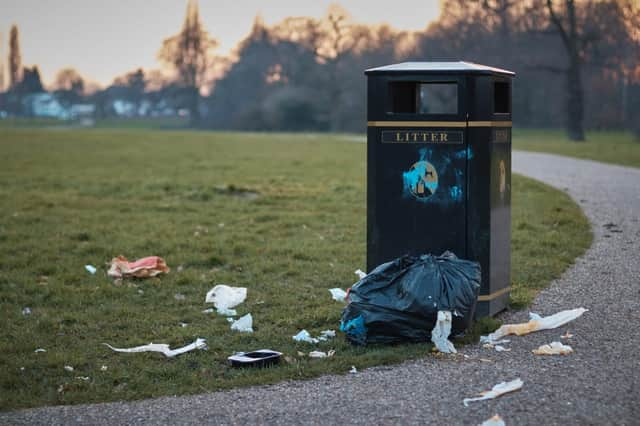The psychology behind littering explained - and why lockdown has made it worse


In recent weeks, shocking images have emerged of litter strewn across the UK's beauty spots, from Edinburgh's parks to Bournemouth beach.
As lockdown has begun to ease in recent weeks, day trippers across the UK have headed out to enjoy the sun - unfortunately leaving tonnes of litter behind them. The images of glass bottles, food packaging, nappies and other kinds of debris strewn across the country's best-loved landscapes has left many in shock, questioning what drives people to behave so selfishly.
Why do we litter?
Advertisement
Hide AdAdvertisement
Hide AdLittering, says environmental psychologist, Lee Chambers, is more complex than people think - and sometimes more than just a moment of selfishness.
"Littering appears to be a very simple concept, whereby an individual chooses to do either the right thing by disposing of their litter in the correct way, or the wrong thing by leaving the litter in an unsuitable place," explains Chambers.
"However, the more we have studied this, the more we have come to realise that both the environment and the context play a significant role."
The existing condition of someone's surroundings can play a role in their decision to litter, it turns out.
Advertisement
Hide AdAdvertisement
Hide Ad"Put simply, if an area is well maintained, and free of rubbish, then we are less likely to litter. Conversely, if a place has a lot of litter and poor access to rubbish bins, we are more likely to litter," says Chambers.
It's possible, therefore, that people who wouldn't usually litter have been encouraged by the "environmental cues" of existing litter to also leave their rubbish behind.
Does psychology play a part?
As well as environmental cues, Chambers also believes individual beliefs or values may play some part in the likelihood of littering.
"Your views on the environment affect how you approach waste disposal. How much you believe an area is both scenic, and how much you care about the area, also impact how likely people are to litter," explains the psychologist.
Advertisement
Hide AdAdvertisement
Hide Ad"The choice to litter passes through a number of lenses and is affected by culture, values, norms and the scenario".
While littering has always been a problem, lockdown seems to have exacerbated the issue, with clean-up volunteers reporting a much higher volume of rubbish than usually seen in their local area.
One of the reasons for this, says Chambers, is more practical than psychological.
"Likely many other services during the lockdown, waste-based services have been stretched, and this has resulted in some areas being more prone to littering and fly-tipping," he comments.
The knock-on effect of this, however, is pyschological.
Advertisement
Hide AdAdvertisement
Hide Ad"This is problematic as people start to justify leaving litter as the area is already untidy. With that social proof, others then leave litter, too, leaving beaches covered because 'my little bit of litter in all this rubbish doesn’t matter'," says Chambers.
The 'picnic effect'
What's more, the ban on foreign travel has led to people travelling a long way for a beach or beauty spot, leading to more litter.
"It's [littering] also amplified by people travelling outside of their communities, to places they care about less," explains the psychologist.
With people only permitted to spend time outdoors with each other, extra waste is also being generated by the "picnic effect."
Advertisement
Hide AdAdvertisement
Hide Ad"There is also the element of more waste being generated outdoors, the picnic effect so to speak, and the pandemic itself is shifting people to use more disposable items, leaving greater scope for littering," says Chambers.
Why is there less littering in some countries?
Some countries around the world seem to have much less of a problem with littering. In Japan, for instance, strict waste management laws have encouraged a culture of recycling and always taking litter home.
So what makes people in countries like this less likely to litter?
Chambers says that "the overarching culture of disposability and waste awareness play a massive role" in the prevalence of littering, and this culture is something that can be influence by "how governments and businesses treat waste and recycling".
Advertisement
Hide AdAdvertisement
Hide AdThis means that messaging about waste should be clear, with areas maintained to high standards. Chambers says that encouraging people to dispose of their litter properly could be done in the short term with "colourful bins and labels on packages" as well as "punitive policy" punishing offenders.
Long term change, he says, "involves an investment from all sides, and a willingness to change the culture of consumption, waste, and environmental interaction."